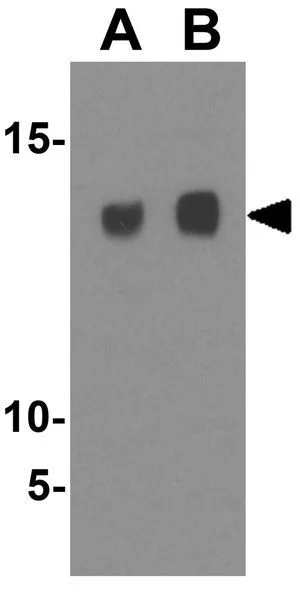
WB analysis of A-20 cell lysate using GTX85436 SLPI antibody. Working concentration : (A) 1 and (B) 2 microg/ml
SLPI antibody
GTX85436
Overview
- SupplierGeneTex
- Product NameSLPI antibody
- Delivery Days Customer9
- Application Supplier NoteWB: 1 - 2 microg/mL. *Optimal dilutions/concentrations should be determined by the researcher.Not tested in other applications.
- ApplicationsWestern Blot, ELISA
- CertificationResearch Use Only
- ClonalityPolyclonal
- Concentration1 mg/ml
- ConjugateUnconjugated
- Gene ID20568
- Target nameSlpi
- Target descriptionsecretory leukocyte peptidase inhibitor
- Target synonymsALP; antileukoproteinase; secretory leukocyte protease inhibitor
- HostRabbit
- IsotypeIgG
- Protein IDP97430
- Protein NameAntileukoproteinase
- Scientific DescriptionSecretory leukocyte protease inhibitor (SLPI) is produced at mucosal surfaces, primarily the upper respiratory tract and is thought to play an important role in the antiprotease defense mechanism of the lung. SLPI forms inhibitory complexes with numerous proteolytic enzymes such as neutrophil elastase, and has been shown to possess anti-inflammatory, anti-viral, and antibacterial activities. Its expression in oral epithelial cells is stimulated by HIV-1 gp120, suggesting that SLPI is a component of the oral mucosal response to HIV-1. In peripheral blood monocytes, SLPI can inhibit NF-kB activation by inhibiting IkB degradation in the cytoplasm and competing for NF-kB binding sites in the nucleus. This attenuation of the inflammatory response may also act to suppress liver metastases and other cancer cell invasions, but promote blood-borne metastasis via an invasion-independent pathway.
- Storage Instruction-20°C or -80°C,2°C to 8°C
- UNSPSC12352203
